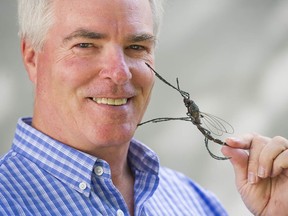An SFU entomologist answers our questions about a bad bug season and what to do about it

.
If you were surprised by the number of mosquitoes you saw in Metro Vancouver this summer, an expert on nuisance insects has some advice: Be thankful you don’t live in Central America, or Winnipeg, for that matter.
Announcement 2
.
Carl Lowenberger is a professor in the department of biological sciences at Simon Fraser University specializing in insects, parasites and how they can be vectors of diseases that negatively affect animal and human health.
Where Lowenberger conducts his field studies, in the humid tropics of Central America, mosquitoes aren’t so much a bloody nuisance as they are a constant health threat. They are carriers of worrying diseases such as malaria, dengue, Zika virus and yellow fever.
Here in BC? Not that much. But they’ve been a problem this summer, so we’re asking for your input and advice.
Why are mosquitoes so bad this year?
Lowenberger explains that there are two predominant species of mosquitoes on the Lower Continent. One type winters in places like cellars and barns and when it gets a little warm they are good to go. “These are the first ones you will see.”
Announcement 3
.
The other species, and the one that is problematic this summer, Aedes, lays eggs that hibernate instead. They don’t put them in the water but just above it, like on the banks of rivers. In spring, when the weather warms, the snowpack melts and rivers rise, the water triggers the eggs into action. Cue the swarm.
Because this spring stayed cool and wet, Lowenberger says it was a slow build up to perfect conditions and then, boom. Warm weather, more rain, melting snow, and thus high water levels in the Fraser River meant that hatching started all at once.
In addition, Aedes eggs can remain viable for several years, waiting for the right conditions in spring. This year turned out to be perfect and several years worth of eggs were ready to hatch. “All those larvae are sprouting at the same time.”
Announcement 4
.
How long should we expect it to be like this?
“I suspect it will peak in early August, if it hasn’t already,” says Lowenberger.
The current forecast of warm to hot and dry weather through the latter part of July is exactly what the mosquitoes don’t need to keep hatching. “Probably by mid-August most will be gone, I hope.”
And September tends to cool down a bit and stay mostly dry, so it shouldn’t be a problem anymore in the last days of summer.
Does this big hatch have something to do with climate change?
“Absolutely,” says Lowenberger. A changing climate has meant that BC, like elsewhere, is experiencing greater temperature swings, heavier rainfall when it does arrive, larger snowpacks, and generally more extreme weather patterns.
ad 5
.
“It definitely has an impact on mosquito populations when the pendulum swings to extremes.”
Should we worry about health problems caused by mosquito bites?
“They are a nuisance, but not really a concern,” Lowenberger says. “The number of cases of mosquito-borne disease (in BC) is essentially zero.”
In theory, we could see disease transmission from mosquitoes on the coast, but there aren’t enough problematic pathogens around. Someone could, for example, contract dengue fever while traveling to an area where it is endemic and bring it back. It just doesn’t happen here except in extremely rare cases.
“We have the vectors (the mosquitoes), but we don’t have the diseases circulating.”
ad 6
.
That is not the case everywhere in Canada. In Manitoba, mosquitoes are enough of a concern that the city of Winnipeg has a full-time entomologist whose main job is to track and eliminate hatchings.
How can we combat the annoying creatures?
Repellents like citronella, lotions containing DEET and other insect-deterring compounds have varying levels of effectiveness, but Lowenberger says DEET “has been the gold standard” for a while now.
Commercial DEET products greatly dilute the chemical repellant. (It’s called N,N-diethyl-meta-toluamide, but let’s stick with DEET, okay?) That’s a good thing because a 100-percent solution could break down a raincoat’s fabric.
Lowenberger says to use your common sense when applying it and to be careful about the concentration of DEET in products you put on young children.
Another important way to keep mosquitoes at bay is to keep standing water away from your garden. Lowenberger himself has large tubs in his garden and frequently sees grubs in them. “If you leave standing water, they will find it and lay their eggs.”
Unfortunately for some, there are parts of the Lower Mainland that naturally have the right conditions for lots of mosquitoes this year, especially communities along the Fraser like Langley and Maple Ridge.
